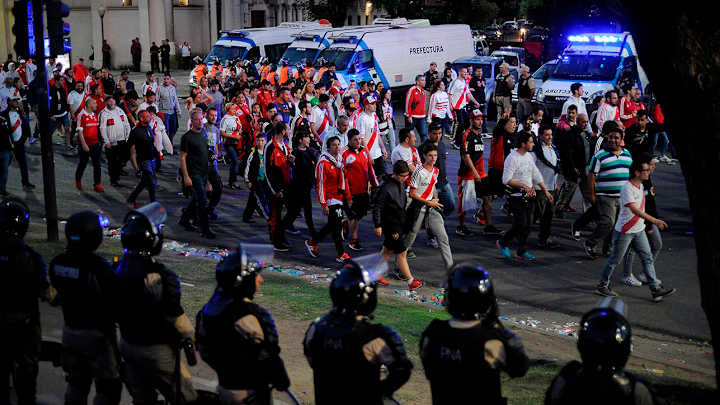Marred by Violence, Copa Libertadores Final Hits Fever Pitch

BUENOS AIRES, Argentina – The second leg of the Copa Libertadores final between River Plate and Boca Juniors, the game that was billed as the derby to end all derbies, didn’t even start. The game was abandoned two hours and twenty minutes after it should have kicked off amid serious violence outside the ground, after the Boca team bus had been attacked as it approached River’s Monumental stadium.
There then followed a series of announcements that kick-off had been delayed, first until 6 p.m., an hour after initially scheduled, and then at 7:15, 7:30 and 7:45 local time. It was finally called off at 7:20 and rearranged for 5 p.m. (3pm ET) on Sunday. The machinations that led to that decision will be scrutinized as closely as the trouble.
The mood had initially seemed expectant and excited as thousands of River fans descended on el Monumental, while Boca fans, because of the ban on away fans in Argentina, made for their stadium, la Bombonera, eight miles away, where the game was being broadcast on a big screen.
CARON: WATCH: Boca Juniors Bus Attacked En Route to Monumental, Copa Libertadores Final Postponed
The trouble began as Boca’s team bus approached the stadium. Its police escort made what locals say was the surprising decision to turn down Avenida Monroe, where it was surrounded by River fans and pelted with missiles. Subsequent video footage released by the club showed at least five shattered windows.
Gas then entered the bus. Some said it was tear gas fired by police seeking to disperse the crowd; others that it was pepper spray from fans deliberately targeting Boca players—just as River’s players had been the victims of a pepper gas attack in the tunnel when the sides last met in the Libertadores, at la Bombonera three years ago. Forensics experts were seen swabbing the inside of the bus, presumably to ascertain the origin of the gas.
The driver said that he fainted during the attack and that the bus would have crashed had Boca’s vice-present not seized the wheel.
Trouble continued after the incident with the bus. A number of fans forced their way into the stadium, while there were sustained clashes between fans and police, who fired tear gas and rubber bullets. There were further scuffles as River fans, many of whom had been in the stadium for around six hours without seeing a ball kicked even in a warm-up, clashed with police on their way out of the stadium.
Three Boca players sustained injuries, the worst suffered by the midfielder Pablo Perez who was taken to hospital with an eye problem, but Conmebol’s medical team later released a statement insisting no Boca players had suffered injuries bad enough to stop them playing—which didn’t really seem the point. Perez was included in the starting lineup.
Boca eventually agreed to play, but kick-off was delayed by two and three-quarter hours and it was clear they were playing under protest. “They’re obliging us to play,” said the forward Carlos Tevez. “But the truth is we’re not in condition to play. … There are many players who were coughing, with feeling of wanting to vomit. As for me, I have a lot of pain in my throat and just now it was giving me a headache.”
CARR: The Keys, Underlying Stats and Defining Qualities of MLS's Conference Finalists
The midfielder Fernando Gago blamed “the presidents of Conmebol and Fifa [who] wants us to play.” It’s understandable that Conmebol would want its showpiece game to go ahead, and the president of Argentina, Mauricio Macri, himself a former president of Boca, perhaps also had a vested interest in getting the game played given he hosts the G20 summit in Buenos Aires beginning on Thursday.
Violence has long dogged Argentinian football, the dark underside to the color that so attracts foreign audiences. The president of Conmebol, Alejandro Dominguez, had spoken on Friday of the need to separate the passion from the violence, and the difficulties of doing so. He had also promised that the move to a one-off final from next year would be safe, but after this chaos, the thought of what might unfold were tens of thousands of Argentinians supporting rival clubs to make the journey west to Santiago, where next year’s showpiece will be held, is deeply disturbing.
There must be concerns too about Sunday’s rearranged game. It will not be played behind closed doors, which raises the prospect of angry Boca fans making for the stadium to take their revenge.
In the end, though, the decision to postpone was surely the right one. Had River won, Boca would surely have appealed against the result and in the circumstances, it would have been hard for anybody to concentrate on the actual game. The damage, though, to the reputation of Conmebol and Argentinian football has already been done.
